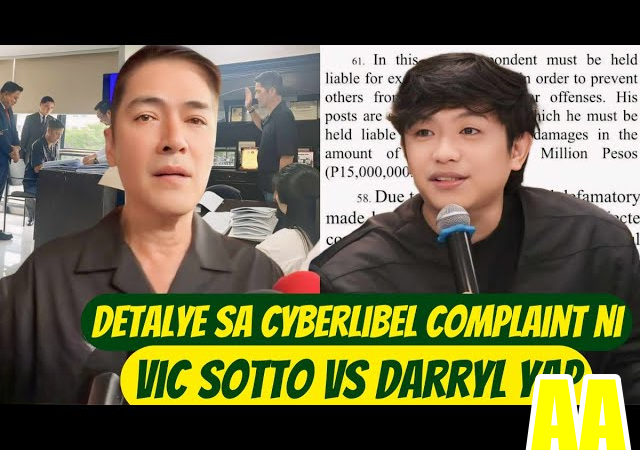Veteran Filipino actor Vic Sotto filed a cyberlibel complaint against filmmaker Darryl Yap, stemming from Yap’s movie about the life of actress Pepsi Paloma. The complaint alleges that the film contained false and defamatory statements about Sotto, causing him significant reputational damage. The case highlights the intersection of artistic expression, freedom of speech, and the legal protections afforded to individuals against defamation in the digital age.

The core of Sotto’s cyberlibel complaint rests on the assertion that the film contains false statements about him and his relationship with Paloma. These statements, according to Sotto, are presented as facts within the film, damaging his reputation and causing him significant emotional distress. The specific statements in question are likely to be central to the legal arguments presented in court.
To establish cyberlibel, Sotto would need to prove that the film contained false statements of fact about him, that these statements were published online (through the film’s distribution on digital platforms), and that these statements caused him damage. The burden of proof in cyberlibel cases is substantial, requiring clear evidence of falsity and demonstrable harm.
The alleged defamatory statements likely relate to the film’s depiction of Sotto’s involvement in Paloma’s life and career. The specific scenes or dialogues within the film that Sotto considers defamatory are likely to form a significant part of the evidence presented during the legal proceedings. The details of these alleged defamatory statements remain largely undisclosed to the public.
Yap’s defense is likely to center on freedom of expression. He might argue that the film is a work of fiction, artistic expression, and even a form of social commentary, and therefore protected under the constitutional right to freedom of speech. He may contend that any negative portrayal of Sotto is not based on verifiable facts but rather on creative interpretation or artistic license.
The legal battle between Sotto and Yap involves a crucial interplay between freedom of expression and the right to protect one’s reputation from defamation. Courts often navigate a delicate balance between these two fundamental rights, ensuring that artistic expression is not unduly restricted while also protecting individuals from false and harmful statements.
The case will likely involve a significant amount of evidence, including expert testimonies on defamation law, film analysis, and potentially witness statements. The court will need to carefully examine the film’s content, compare it to verifiable facts, and assess whether the statements are indeed false and caused demonstrable harm to Sotto’s reputation.
The use of digital platforms for the distribution of Yap’s film brings into focus the complexities of cyberlibel law. The rapid dissemination of information online amplifies the potential harm caused by defamatory statements and underscores the need for clear legal frameworks to address online defamation.
The outcome of the case will significantly influence the landscape of filmmaking in the Philippines, particularly concerning the portrayal of real individuals in films. The decision will set a precedent for future cases involving similar allegations of cyberlibel, impacting how filmmakers approach biographical works and the depiction of real-life figures.
The legal proceedings are expected to be lengthy and involve multiple hearings and potential appeals. The process will likely be resource-intensive for both parties, requiring significant legal expertise and financial resources. The duration will depend on the court’s schedule and the complexity of the evidence presented.
The case serves as a reminder of the importance of responsible filmmaking and the ethical considerations filmmakers should prioritize when creating content that involves real individuals. The controversy underscores the need for filmmakers to be mindful of the potential impact of their work and to engage in responsible storytelling.
This legal dispute is more than a simple clash between two individuals; it’s a case that will redefine the boundaries of freedom of expression and the legal protections afforded to individuals against online defamation in the Philippine context. The decision will set a precedent for future cases and significantly impact the Filipino film industry. The eventual outcome will be closely watched and analyzed for its implications.



